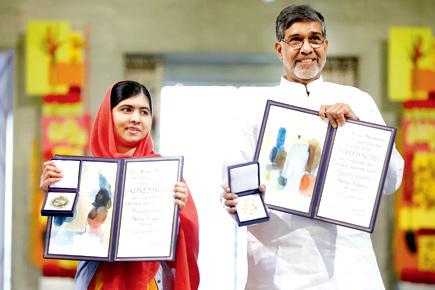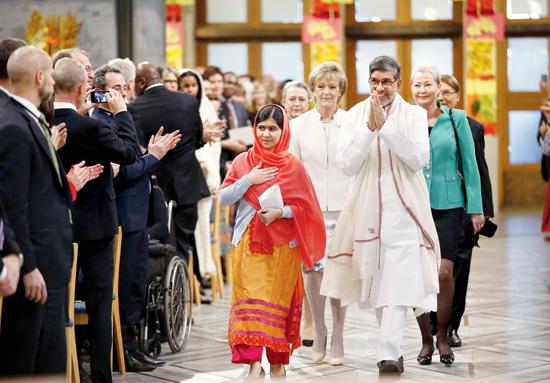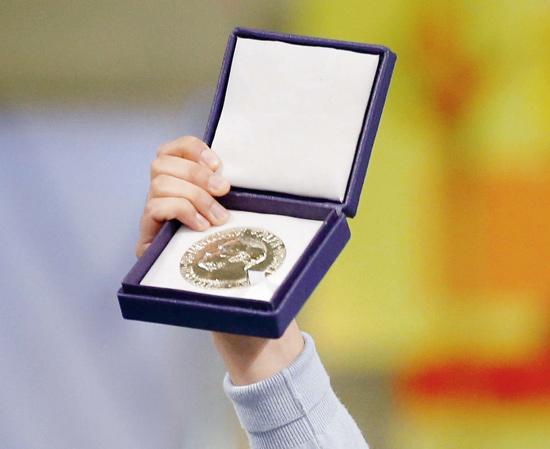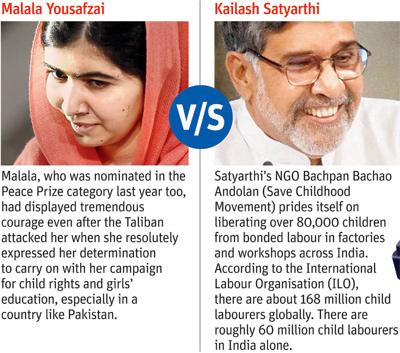Champions of peace Kailash Satyarthi and Malala Yousafzai receive Nobel Peace Prize as world salutes their pioneering work on promoting child rights in the troubled sub-continent

Kailash Satyarthi and Malala Yousafzai
Oslo: Kailash Satyarthi and Malala Yousafzai — Indo-Pak, ‘champions of peace’ — yesterday received the Nobel Peace Prize for 2014 for their pioneering work on promoting child rights in the troubled sub-continent, as they made an impassioned plea to globalise compassion.
ADVERTISEMENT

Nobel Peace Prize laureates Kailash Satyarthi and Malala Yousafzai arrive for the Nobel Peace Prize awards ceremony at the City Hall in Oslo, Norway. Pics/AFP
“Satyarthi and Yousafzai are precisely the people whom Alfred Nobel in his will calls ‘champions of peace’,” Chairman of the Norwegian Nobel Committee Thorbjorn Jagland said in his speech before awarding them the prestigious prize here.
“A young girl and a somewhat older man, one from Pakistan and one from India, one Muslim, the other Hindu; both symbols of what the world needs: more unity. Fraternity between the nations!” he added.

Satyarthi said: “I refuse to accept that the world is so poor, when just one week of global military expenditure is enough to bring all of our children into classrooms.”
“I refuse to accept that the shackles of slavery can ever be... stronger than the quest for freedom,” said 60-year-old.
Satyarthi asked the audience to feel the child inside them and globalise compassion.
The audience included King Harald V of Norway and Pakistan’s former prime minister Yousuf Raza Gilani. “Let us inculcate and transform the individuals’ compassion into a global movement. Let us globalise compassion. Not passive compassion, but transformative compassion that leads to justice, equality, and freedom,” Satyarthi said after receiving the award at the Oslo City Hall.
Invoking Mahatma Gandhi, he said, “If we are to teach real peace in this world... we shall have to begin with the children.” ‘I humbly add, let us unite the world through the compassion for our children.’
“I represent here the sound of silence. The cry of innocence. And, the face of invisibility. I have come here to share the
voices and dreams of our children, our children, because they are all our children,” he said, adding that the crime against children has no place in a civilised society.
Youngest awardee Malala, who was nominated in the Peace Prize category last year also, became the youngest ever Nobel laureate.
In her speech, she said, “I am honoured to receive this award together with Kailash Satyarthi, who has been a champion of children’s rights for a long time. Twice as long, in fact, than I have been alive. I am also glad that we can stand together and show the world that an Indian and a Pakistani can be united in peace and together work for children’s rights.”
“This award is not just for me. It is for those forgotten children who want education. It is for those frightened children who want peace. It is for those voiceless children who want change,” she said in her acceptance speech.
“I am here to stand up for their rights, raise their voice...it is not time to pity them. It is time to take action so it becomes the last time that we see a child deprived of education,” she said.
Recalling her speech at the UN, she said “One child, one teacher, one pen and one book can change the world.”
She dedicated the Nobel Prize money to the Malala Fund, to help give girls everywhere a quality education.
“The first place this funding will go is where my heart is, to build schools in Pakistan, especially in my home of Swat and Shangla,” she said.
She said Martin Luther King, Nelson Mandela, Mother Teresa and Aung San Suu Kyi once stood on the same stage and hoped the steps that Satyarthi and she has taken so far will also bring change — lasting change.
“It is not time to tell the leaders to realise how important education is — they already know it — their own children are in good schools. Now it is time to call them to take action. We ask the world leaders to unite and make education their top priority,”
she added.
No place for violence
Chairman of the Norwegian Nobel Committee Jagland said that violence and repression cannot be justified in any religion. “Islam, Christianity, Judaism, Hinduism and Buddhism protect life and cannot be used to take lives,” he said.
Echoing his views, Satyarthi said, “All the great religions tell us to care for children. Jesus said: ‘Let the children come to me; do not hinder them, for the kingdom of God belongs to them.’ The Holy Quran says: ‘Kill not your children because of poverty.’
“I refuse to accept that all the temples and mosques and churches and prayer houses have no place for the dreams of our children,” he said.
“I challenge the passivity and pessimism surrounding our children. I challenge this culture of silence, this culture of neutrality,” he said, and called upon all the governments, inter-governmental agencies, businesses, faith leaders, the civil society, and everyone to put an end to all forms of violence against children.
“Today, I see thousands of Mahatma Gandhis, Martin Luther Kings, and Nelson Mandelas marching forward and calling on us. The boys and girls have joined. I have joined in. We ask you to join, too,” he added.
Musical ceremony
>> The ceremony began with an Opera performance by Norwegian classical pianist Edward Grieg and singer Hans Christian Andersen.
>> It was followed by Pakistani singer Rahat Fateh Ali Khan’s performance on his uncle Nusrat Fateh Ali’s famous Sufi composition ‘Allahu Allahu’ with his troupe.
>> Amjad Ali, Amaan and Ayaan took to the stage post the felicitation of Malala and Satyarthi to perform their ‘Raga For Peace’.
Tales of courage
Satyarthi (60), who gave up his job as an electrical engineer to run an NGO for rescuing children from forced labour and trafficking, and 17-year-old Malala, who survived a near-fatal Taliban attack two years ago with determination advocating education for girls, were named by the Nobel Peace Prize Committee for the prestigious award on October 10. They will share the prize money of USD 1.1 million.

Nobel Medal unravelled
>> The Nobel medal is 18-carat green gold plated with 24-carat gold, and weighs around 175 grams
>> It is protected against scratches and undergoes a meticulous process to take its final shape
>> The medals for Physics, Chemistry, Physiology or Medicine and Literature were modelled by Swedish sculptor and engraver Erik Lindberg, while the Peace medal was designed by Norwegian sculptor Gustav Vigeland
>> The face of the medal of the Norwegian Nobel Committee shows Alfred Nobel in a pose slightly different from that of the other medals
>> The inscription in Latin reads: “Pro pace et fraternitate gentium” which means “For the peace and brotherhood of men”
>> The other side of the Nobel Peace Prize medal represents a group of three men forming a fraternal bond
>> The Nobel medals were cast by the Royal Mint of Myntverket in Eskilstuna, Sweden, from 1902 to 2010.
>> In 2011, the medals were cast by Det Norske Myntverket (Mint of Norway) in Kongsberg, Norway.
>> Thereafter the medals were made by Svenska Medalj in Eskilstuna in Sweden.
Why is Nobel Peace Prize given in Oslo?
Since 1901, when Nobel Prizes were first given, Peace Prize has been awarded by a committee of five, appointed by the Norwegian Parliament Storting in accordance with Alfred Nobel’s will. Alfred Nobel never disclosed why he didn’t give the task of awarding the Peace Prize to a Swedish body. The reasons are speculative.One argument is that Nobel admired Norwegian patriot Bjornstjerne Bjornson while another is that Storting was the first national legislature to vote in support for the international peace movement. Nobel may also have favoured distribution of the tasks related to the prize within the Swedish-Norwegian union or he may have feared that given the highly political nature of the Peace Prize, it might become a tool in power politics thus reducing its significance as an instrument for peace.
Assam tea at the ceremony
There is an Assam connection to this year’s Nobel Prize ceremony, with a special tea served at the grand banquet coming from the northeastern state. For the first time, the Nobel Museum Tea Blend, created in honour of the scientist and Nobel creator Alfred Nobel, formed a part of the Nobel Banquet. The blend is made of Assam and Chinese Keemun tea. “In honour of Alfred Nobel, we have composed a special tea blend. The blend is based on a Chinese Keemun tea produced in Qimen county situated in Anhui Province. Blended together with an Indian Assam tea, this tea attains a gorgeous colour and lovely scent,” the Nobel Museum said about the unique tea. “The tea is flavoured with the finest bergamot from Italy, complemented with the sweetness of Swedish raspberries and the fresh taste of orange. A true cosmopolitan blend,” it said.
 Subscribe today by clicking the link and stay updated with the latest news!" Click here!
Subscribe today by clicking the link and stay updated with the latest news!" Click here!







